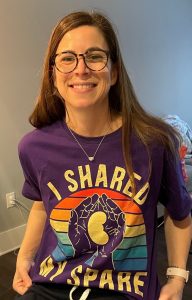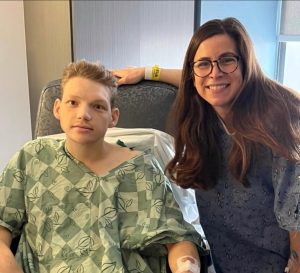Top 10 Things to Know About Being a Living Kidney Donor
On March 4, 2022, I took the first step toward potentially becoming a living kidney donor. I filled out a simple online survey and submitted my information. On February 22, 2023, I became a living kidney donor as part of a paired exchange donation.
My intended recipient received his kidney that same day at Emory Transplant Center in Atlanta. Because so many people have asked questions about my journey, I thought I’d share my Top 10 Things to Know About Being a Living Kidney Donor.

1. Donating a kidney is easier than you think. Some people may think donating a kidney is difficult, but I can list many things significantly harder than having surgery to donate a major organ:
- A messy divorce
- Solo parenting three young children
- Walking into a room full of kindergarteners as a substitute teacher
- Going back to school at age 46
- Having a C-section and delivering preemie/NICU twins
- Advocating for my daughter in an IEP meeting
- Having/recovering from a hysterectomy
- Running a mile in under 10 minutes
- Living with depression
2. It is an amazing gift to donate a kidney, but the real heroes are the transplant recipients. Some people have called me a “hero,” which feels grossly inaccurate. The recipients are the ones who have been on the transplant list and/or on dialysis for years, taking 25+ pills daily to keep their health stable enough while they wait for a kidney, and then to stave off rejection afterward. They are endlessly patient, mostly because they have no other choice.
3. Living donor kidneys last longer and are rejected less frequently than deceased donor kidneys. Also, living donor kidneys start working right away in their recipients because they have spent less time outside of a body, whereas deceased donor kidneys can take several days or longer to begin functioning at their peak. Living donor kidneys are preferable, but harder to come by because folks don’t really know the facts or take the time to investigate.
4. Living kidney donors do not get paid for their organs. Receiving compensation for an organ is illegal. Some of us are lucky enough to get reimbursed for expenses incurred along the way; for example, travel may be involved (I had to fly from Kansas to Atlanta, a kidney hub, and where my intended recipient lives). I paid for everything up front (airfare, Ubers, hotel, etc.) but was reimbursed through the Donor Shield program within two weeks after I submitted my documentation. I was also fortunate enough to receive some financial support from my intended recipient’s family and friend network, as well as from my own circles. All of the medical testing, labs, evaluations, procedures, and surgery are 100% covered.
5. You will need support in your kidney donation journey. When you become a kidney donor, you’ll need a lot of emotional support from friends and family. You will need someone to be with you in the hospital and to help care for you afterward, especially in the days and weeks following surgery. Modern medicine is simply incredible, but even in the best of circumstances, there may be ups and downs. I fought for nearly a year to be able to donate my kidney to my friend’s son. After I flew home following the surgery, I had a few weeks where I felt alone and adrift. I often worried about my paired recipient and my intended recipient. I do not know my paired recipient and may never have that privilege. I think it was the first time in a year that I was no longer making phone calls, writing emails, scheduling appointments, having labs drawn, or planning travel and time away from my family: it was the calm after the storm. Of course, I survived, but it was not easy. The emotional part was a lot harder than the surgery itself! Reach out to family and friends, especially those who have been through the process themselves.
6. Incisions and healing are different for everyone. Your incisions will vary depending on your surgeon, your overall health, any previous surgeries, etc. Healing takes time, so listen to your body. Drink tons of water and don’t push yourself. There are folks who return to running marathons a few months after donating, but recovery is not a race. I returned to work part-time around three weeks after I donated, but I was exhausted by the time I got home. When I overdid it, my big incision throbbed and told me to lie down. I was warned not to lift anything over five pounds for at least six weeks, and I followed that advice strictly. I walked a lot, and by three or four months post-op, I was able to jog a mile or two again.
7. Life with one kidney is not very different from life with two. I still lead an active lifestyle and exercise daily. My life expectancy is the same as it was before I donated. I still eat the same foods. I have zero restrictions and have had no complications. Of course, there are exceptions to this. It’s important to note that each person goes through an extensive amount of testing prior to being cleared to donate—blood tests, urine samples, EKG, lung x-rays, ultrasounds, and various appointments with doctors, surgeons, and social workers—and transplant teams will only accept donors they think will do well with one kidney. The remaining kidney learns and adapts to take on the role of what two kidneys did prior to surgery. However, if something were to happen to my kidney and I needed a transplant, because I donated through the NKR I would immediately be bumped to the top of the list through the NKR’s kidney prioritization policy.

8. People donate for all kinds of reasons. I had a friend whose son had a rare genetic disorder and desperately needed a (second) kidney transplant. As a mother myself, I knew I would do anything to help. I educated myself by reading online and asking questions. All I can say is that I felt moved to do this; I felt I needed to do this. I truly wanted to donate directly, but once I learned I wasn’t a perfect match, I decided I would register with the NKR with my intended recipient as a paired match. Within a few days of being on the list, we were notified that we’d both been matched and that surgery would take place in about three weeks. It felt surreal. I can’t describe what it’s like to know you can give in this way and impact the trajectory of someone’s life.
9. I love being a part of my intended recipient’s extended “family” and I feel grateful that I could help him in this unique way. Waking up after donating was like a dream: I finally did it! I helped someone! Actually, I helped three people because it was a three-way paired kidney swap, so three people got new kidneys because of the chain I was in. #happydance
10. I am now a member of the “One Bean Club.” I have connected with other donors all over the country. I have peace knowing I helped someone live a better, healthier life– and I’m connected to him always. It’s a powerful feeling that can lift me up when I’m having a rough day. I shared a piece of myself that seemed so little, but it’s doing big things. I helped do that. Wow.
About the Author

Erin Best was born and raised in New Orleans, home of po’boys, King Cake, Mardi Gras and beignets. She left NoLa for her bachelor’s degree at Millsaps College in Jackson, MS, then returned to the University of New Orleans for her master’s in American/British literature. She still loves going back, even though she lives in Kansas now with her husband, Tom.
Erin is a devoted mom, stepmom, and dog mom, who loves reading and writing, as well as exercising and baking (challah if you must know, but she’s not so great at the fancy braids). Erin craves learning and is a persistent and passionate advocate, both for humans and animals. She campaigns for disability, LGBTQIA, human rights and mental and emotional health, especially since she has an A+ in anxiety.
She is currently enrolled in the master’s program at Pittsburg State University with a focus on teaching, and happy to have a second chance at something new in life, she’s proudly earning a 4.0 halfway through her program. She began a blog recently, Teacher Features, as part of a class assignment but is going to keep it active. She’s substitute teaching until 2024, when she will student teach and graduate (again).